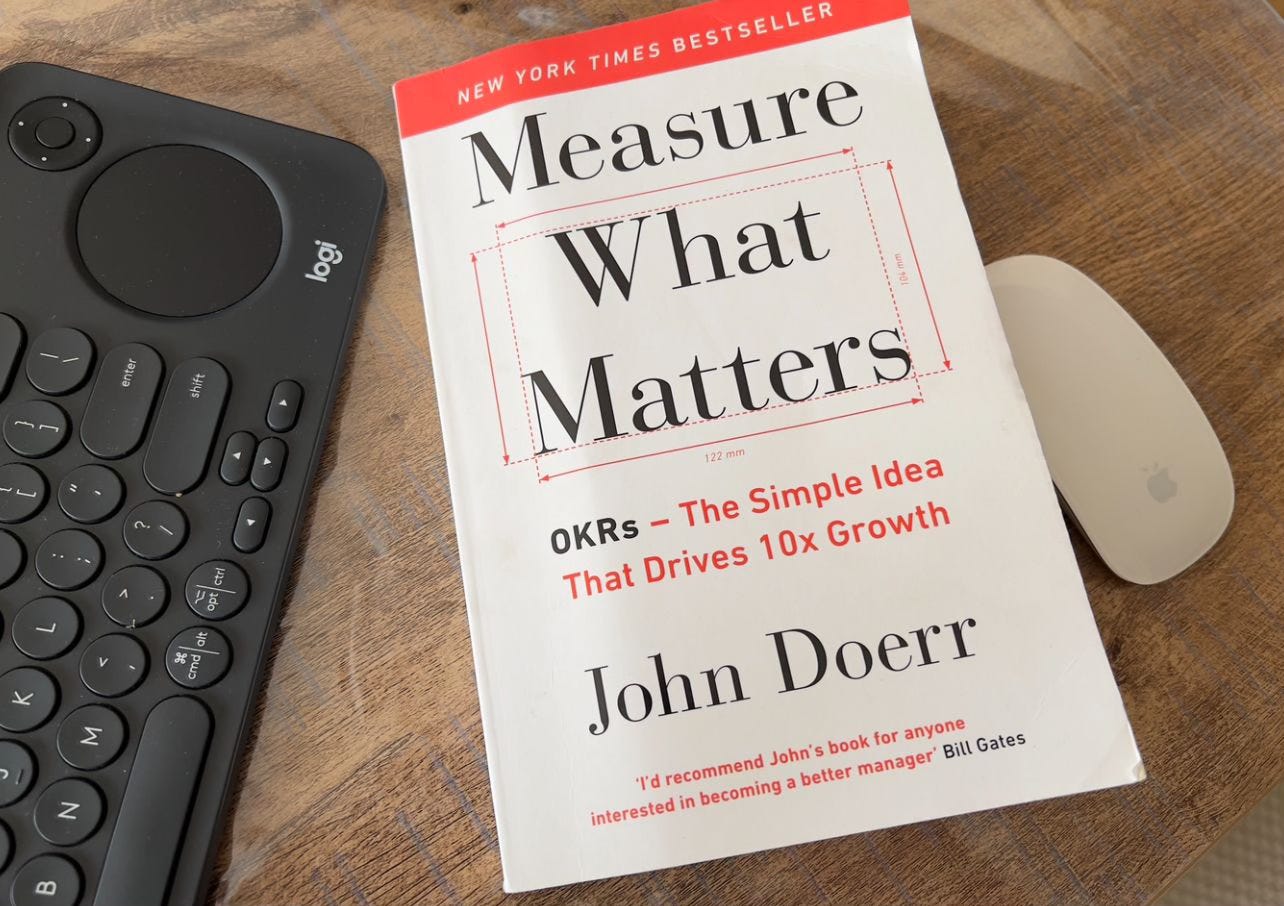In the fast-paced world of B2B segment, where long sales cycles and complex products dominate, staying aligned and focused is a constant challenge. As a product marketer, you’re juggling innovation, customer satisfaction, and operational efficiency. So, how do you keep all those moving parts working in harmony while driving real results?
The answer lies in Measure What Matters by John Doerr.
This book introduces a framework that can revolutionize the way you set goals and measure success: Objectives and Key Results (OKRs). With clear objectives and measurable key results, OKRs offer a roadmap to align teams, track progress, and stretch for extraordinary outcomes. Let’s dive into why this book is a must-read for B2B product marketers and how its lessons can transform your business.
What Are OKRs?
Imagine steering a ship without a compass? That's how challenging it can be without a clear objective. OKRs are like North Star for an organization. They provide direction, clarity, and a way to measure progress.
OKRs are a simple yet powerful goal-setting methodology that helps organizations focus on what matters most.
They consist of two key components:
Objective: A clearly defined, inspiring goal you want to achieve.
Key Results: Specific, measurable milestones that track your progress toward that goal.
Unlike traditional KPIs (Key Performance Indicators), OKRs are designed to be dynamic, ambitious, and aligned across teams. They’re about setting a bold vision and then breaking it down into actionable steps.
1. Focus on What Matters
Too often, businesses try to do too much at once, diluting their efforts and impact. OKRs force you to focus on a few high-impact objectives. For B2B product marketers, this could mean prioritizing innovations that solve customer pain points or streamlining manufacturing processes to enhance product quality.
2. Align Teams Across Functions
One of the biggest challenges in B2B industries is aligning diverse teams like sales, marketing, and R&D. OKRs create a common language and shared goals, ensuring everyone works toward the same objectives. This alignment fosters collaboration and eliminates silos.
3. Track Progress Regularly
Imagine launching a product without knowing whether it’s meeting expectations. OKRs provide a structured way to track progress, enabling you to adjust strategies based on real-time feedback. Whether it’s a dashboard or regular check-ins, the key is to keep your eyes on the target.
4. Set Ambitious Goals
OKRs encourage you to dream big. Ambitious, stretch goals push teams to innovate and think outside the box. For example, you might aim to introduce groundbreaking features or optimize manufacturing processes to reduce costs significantly. While these goals might seem daunting, they often lead to remarkable breakthroughs.
5. Foster a Culture of Continuous Improvement
In today’s competitive landscape, adaptability is key. OKRs promote a culture of learning, innovation, and continuous feedback. Regularly revisiting your objectives and key results ensures you stay responsive to market changes and customer needs.
Buy this book on Amazon, Click here
Key Lessons for B2B Product Marketers
In our world, this translates to setting ambitious but achievable goals that address market needs and customer pain points. It’s about pushing boundaries and driving innovation.
Too many options can also paralyses us. The same goes for business goals. OKR forces to focus on a few high-impact objectives. It also means saying No to the less critical stuff. For eg. Prioritising innovations that resonate with market demands and streamline manufacturing processes to boost efficiency.
Like I've stated in one of my article, if the sales, marketing, R&D are all rowing in different directions, it would be a frustrating situation and a disaster. OKRs align the entire organization around shared goals, ensuring everyone is on the same page. Synchronise marketing strategies with product development and foster a culture of collaboration and transparency.
Imagine running a marathon without a tracker. You'd have no idea how far you've come or how much more to run. OKRs are your markers. They help track progress and keep everyone accountable. Regularly track product launches and marketing penetration efforts. Create dashboards and visuals to monitor and communicate progress.
Ambitious goals drive innovation. OKRs encourage setting stretch goals that push the boundaries of what's possible. It's about daring to a big dream and achieving amazing results. Introduce the value adding features in your products and optimise manufacturing process to reduce costs and improve quality.
In todays fast paced world, no change means falling behind. OKRs promote a culture of continuous improvement and adaptability - regular checks, feedbacks, and being responsive to market changes. Regular reviews to refine strategies based on market feedback essential.
Doer's insights emphasize
The transformative power of OKRs in driving organizational success
The importance of leadership commitment to OKR process
The future potential of OKRs in various sectors.
Why This Book Resonates with B2B Marketers
What sets Measure What Matters apart is its wealth of real-world examples. Doerr illustrates the power of OKRs through stories from Google, Intel, and even nonprofit organizations. While many of these examples come from tech and SaaS, the principles are universal. For B2B marketers, the lessons translate seamlessly into managing complex projects, driving innovation, and aligning cross-functional teams.
Imagine applying OKRs to your next product launch. Your objective might be to become the market leader in a specific category, with key results such as achieving a certain market share, launching the product on time, and securing positive customer feedback. By focusing on measurable outcomes, you can keep your team aligned and motivated.
Why You Should Read This Book
Measure What Matters isn’t just a book; it’s a toolkit for achieving your most ambitious goals. It challenges you to think differently about goal setting and team alignment, making it an essential read for anyone in B2B product marketing. Whether you’re looking to improve operational efficiency, drive innovation, or align your teams more effectively, this book offers actionable insights you can apply immediately.
Final Thoughts
The beauty of OKRs lies in their simplicity and versatility. They provide clarity, foster collaboration, and inspire innovation—all of which are critical in the B2B capital equipment and devices manufacturing sector. If you’re ready to transform your approach to goal setting and team alignment, Measure What Matters is a must-read.
Have you tried implementing OKRs in your organization? What challenges or successes have you encountered? Let’s discuss in the comments below—I’d love to hear your thoughts!
If you found this review insightful, share it with your colleagues or team members. Let’s start a conversation about how OKRs can drive success in B2B industries. And don’t forget to subscribe to my blog for more insights on product marketing and strategy!




